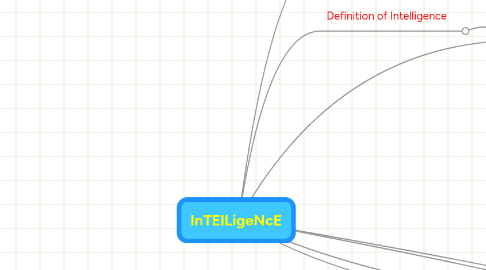
1. Intelligence how much a person knows, understands, and how they behave based off of their genetics, environment, interests and experiences.
2. How do children acquire intelligence? Children acquire intelligence from the points listed under components of intelligence.
2.1. Through their experience
2.1.1. Past experiences
2.1.2. How quickly they can deal with a familiar situation
2.2. Through their environment
2.2.1. Formal Schooling
2.2.2. Parenting
2.2.3. Nutrition
2.2.4. Substance
2.2.5. Family
2.3. Through their interets/interests in learning
2.3.1. Gardner's 8 Intelligences
2.4. Through genetics
2.4.1. Hereditary: What is passed down to them from their birth parents
3. Experiences: Experiences play a major role, because people respond to experiences in different ways. When they do this they weed out what is important and unimportant in their lives. All people respond to experiences differently.
3.1. Dealing with a new situation by drawing on past experience (p242).
3.2. Dealing with a familiar situation quicly and efficiently.
4. The components of the intelligence include genetics, environment, interests, and experiences
4.1. Genetics: What is passed on from generation to generation from the birth parents.
4.2. Environment: Environment is one plays a huge role in intelligent, and can include many different elements such as:
4.2.1. Family closeness and makeup (large family, small family)
4.2.2. Culture
4.2.3. Formal Schooling: Pre-school, and type of school a child attends (charter, public, private).
4.2.4. Parenting: education, occupation, financial status, stay at home parent, discipline
4.2.5. Nutrition
4.2.6. Substances:alcohol abuse, substance abuse
4.3. Abilties/Interests: Interests refers to Howard Gardner's Mulitple Intelligences. What children are interested in and the ways in which they are interested in learning.
4.3.1. Linguistic-using language as a way to express oneself (241).
4.3.2. Logical-Ability to reason logically (241)
4.3.3. Spatial-being able to manipulate objects (241)
4.3.4. Musically inclined
4.3.5. Kinesthetic-movement (using dance or music to learn a desired concept).
4.3.6. Interpersonal-others behaviors
4.3.7. Intrapersonal-ability to be aware of ones own feelings
4.3.8. Naturalist-interest in nature and objects in nature. (241)
4.4. Experiences: Experiences play a major role, because people respond to experiences in different ways. When they do this they weed out what is important and unimportant in their lives. All people respond to experiences differently.
4.4.1. Dealing with a familiar situation quickly and efficiently
4.4.2. Dealing with a new situation by drawing on past experience (p242).
5. Components of Intelligence
5.1. Experiences: Experiences play a major role, because people respond to experiences in different ways. When they do this they weed out what is important and unimportant in their lives. All people respond to experiences differently.
5.1.1. Dealing with a new situation by drawing on past experience (p242).
5.1.2. Dealing with a familiar situation quickly and efficiently
6. Definition of Intelligence
6.1. Intelligence is a persons ability to adapt and function based off of their genetics, environment, interests and experiences.
6.1.1. New node
